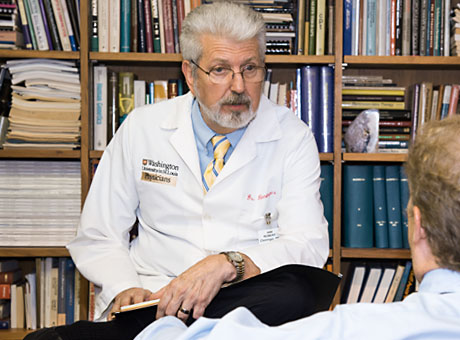
C. Robert Cloninger, MD, PhD, and his colleagues matched precise DNA variations in people with and without schizophrenia to symptoms in individual patients.

C. Robert Cloninger, MD, PhD, and his colleagues matched precise DNA variations in people with and without schizophrenia to symptoms in individual patients.
New research shows that schizophrenia isn’t a single disease but a group of eight genetically distinct disorders, each with its own set of symptoms. The finding could be a first step toward improved diagnosis and treatment for the debilitating psychiatric illness. The research is reported online in
The American Journal of Psychiatry.
About 80 percent of the risk for schizophrenia is known to be inherited, but scientists have struggled to identify specific genes for the condition. Now, in a novel approach analyzing genetic influences on more than 4,000 people with schizophrenia, the research team has identified distinct gene clusters that contribute to eight different classes of schizophrenia.
“Genes don’t operate by themselves,” said C. Robert Cloninger, MD, PhD, one of the study’s senior investigators. “They function in concert much like an orchestra, and to understand how they’re working, you have to know not just who the members of the orchestra are but how they interact.”
Cloninger, the Wallace Renard Professor of Psychiatry and Genetics, and his colleagues matched precise DNA variations in people with and without schizophrenia to symptoms in individual patients.
Although individual genes have only weak and inconsistent associations with schizophrenia, groups of interacting gene clusters create an extremely high and consistent risk of illness, on the order of 70 to 100 percent. That makes it almost impossible for people with those genetic variations to avoid the condition. In all, the researchers identified 42 clusters of genetic variations that dramatically increased the risk.
“In the past, scientists had been looking for associations between individual genes and schizophrenia,” explained Dragan M. Svrakic, PhD, MD, a co-investigator and a professor of psychiatry. “When one study would identify an association, no one else could replicate it. What was missing was the idea that these genes don’t act independently. They work in concert to disrupt the brain’s structure and function, and that results in the illness.”